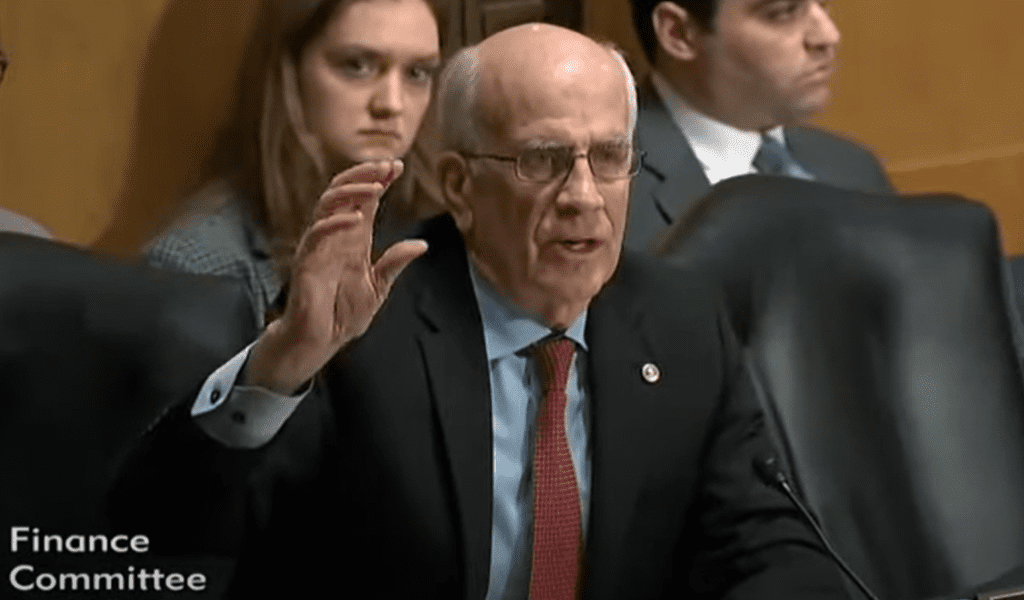WASHINGTON, D.C. – U.S. Senator Peter Welch (D-Vt.), a member of the Senate Finance Committee, today questioned Jamieson Greer, President Trump’s nominee to be the United States Trade Representative (USTR), at his confirmation hearing. Senator Welch demanded that Mr. Greer answer for the impact of the Trump Trade War on American businesses and consumers and outlined the cost of Trump’s new proposed tariffs for Vermont industries. Tariffs on imports from Canada, and subsequent retaliatory tariffs, could result in higher costs and layoffs for Vermonters.
Watch the exchange between Senator Welch and Jamieson Greer, President Trump’s pick for U.S. Trade Representative:

Read excerpts of their exchange below:
Sen. Welch: My view is that trade policy has failed the average American. We’ve exported jobs in return for importing cheap goods, and it’s hollowed out a lot of communities. It’s something that President Trump did talk about…What role do you see tariffs playing in our trade policy?
Mr. Greer: So, with respect to tariffs and trade policy, we need to create incentives to produce in America, and we need to create incentives to get market access overseas. Our average tariff rate in the United States is 3.5%, which is substantially lower than many markets—
Welch: So, you see tariffs as a tool for market access and for onshoring jobs here?
Greer: Exactly. It can be used as a tool for revenue—
Welch: Wait. That’s a whole new thing. Your job is trade policy, and if what we’re talking about is tariffs for revenue, would you agree with me that that’s a tax? That’s raising—the tariffs are ultimately paid by the consumers.
Greer: Taxes, Senator, are an assessment on foreign goods, on the value of foreign goods, made by foreign workers in foreign countries. And then that exporter has to decide—
Welch: I want to stop here a minute. When you’re using your responsibility on trade policy, I get that. But if a tariff is being used essentially as a negotiating tool on a one-off situation— as these recent tariffs on Mexico and Canada were—that’s a tax and it’s beyond trade policy. It’s the president trying to use that power for leverage. Do you think that the proper use of the congressionally extended authority to the president in national emergencies to impose tariffs apply to a national emergency that we have with Canada?
Greer: Yes.
Welch: I don’t.
•••
Welch: This has a huge impact on Vermont. You know, we do most of our trade with Canada. And we had a roundtable, and I just asked various businesses—we had over 150 businesses on this call. And it was everyone from a large, very successful construction company, PC Construction, to a woman who gets yarn and does weaving, and organic farmers. Every one of these people was just stunned at the implications that these out-of-the-blue threats of tariffs were going to have on their businesses. I mean, don’t people deserve a heads up in Vermont before they get whacked with what appears to be a tariff for an individual objective of President Trump?
Greer: So, Senator, the president was very transparent about this for several months that he was contemplating doing this specifically because of the fentanyl and illegal migration issues. And so, I think it is very important for people to understand what might be coming, especially when the president’s going to use his congressionally delegated responsibilities to execute the laws.
Welch: I appreciate you and your candor. But, Mr. Chairman and Ranking Member, I do have concern about the delegation, the abuse of the delegation of tariff authority to a President, to be used in national emergencies. To be used in one-off negotiating tactics. And I do believe that’s a tax. And I don’t think that any President should be able to unilaterally impose a tax. And one of the things I’m increasingly worried about is the abdication of our own Article I authority, and weakening this branch of government, for any President to totally disregard the people’s branch.
On Tuesday, Senator Welch took to the Senate floor to blast the proposed tariffs, which would be a tax on Vermonters. Senator Welch shared stories from Vermonters about how President Trump’s economic policies will impact their family, farm, and community. Watch his speech on the Senate Floor here and read his remarks as delivered here.
###
